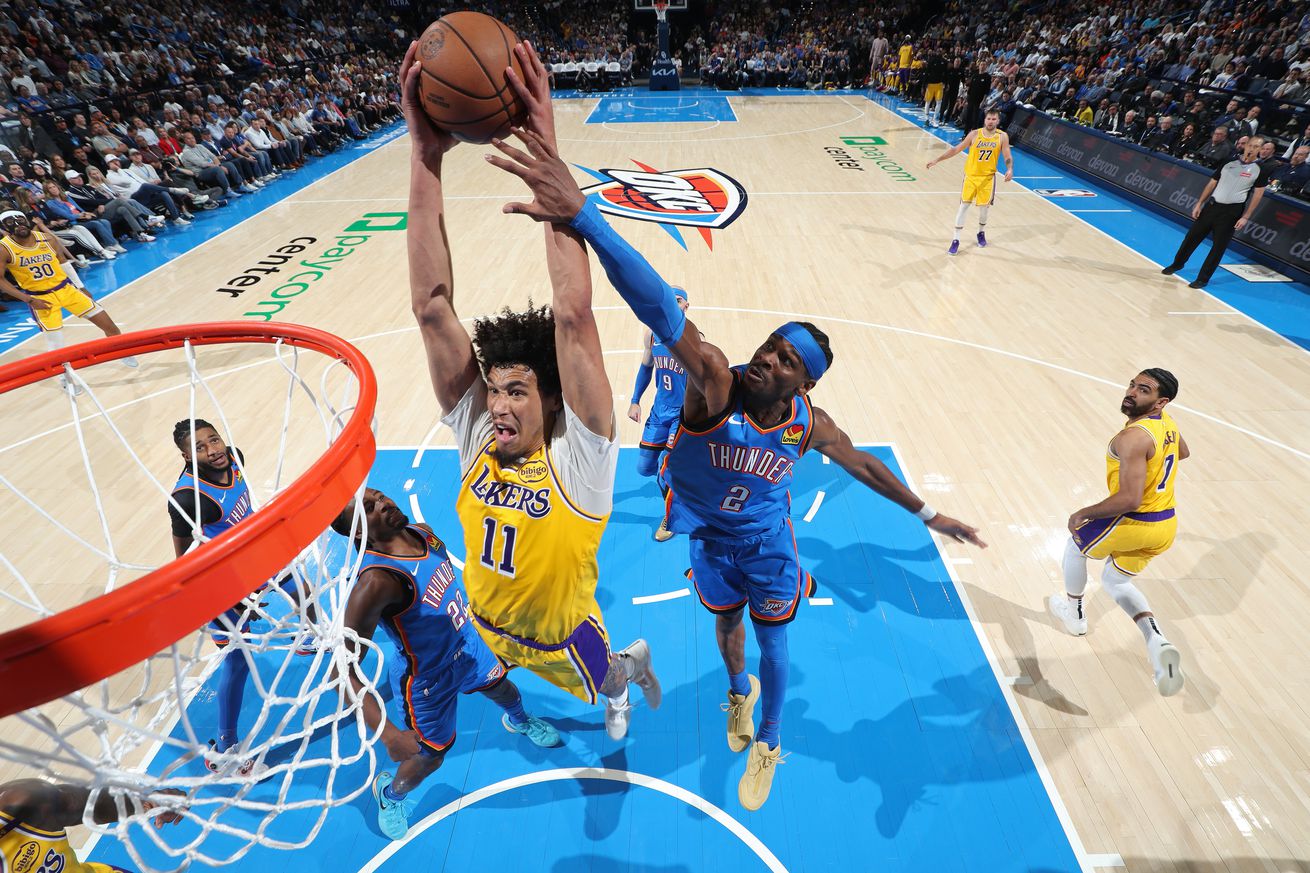
After a breakout regular season, Jaxson Hayes was relegated to a familiar spot once the games really mattered again.
Welcome to our annual Lakers season in review series, where we’ll look back at each player on the team’s roster this season and evaluate if they should be part of the future of the franchise. Today, we continue with a look at Jaxson Hayes.
With the exception of maybe Austin Reaves, no one saw their role increase more this season than Jaxson Hayes.
Entering the year with the expectation of being a backup center once again, Hayes was thrust into a very big role midway through the season. The trade of Anthony Davis and the Mark Williams trade being rescinded left Hayes in an outsized role.
While he finished the regular season largely playing some of the best basketball of his career, the train immediately derailed in the postseason. Given a short leash by head coach JJ Redick, Hayes did himself no favors and, in the end, showed all of his shortcomings at the worst time of the season.
How did he play?
Well, Hayes’ season basically needs to be split into pre-Luka and post-Luka.
Before the trade, he was more or less living up to the expectation for him, even if that meant he was underwhelming as a backup big man. The fact that, with Hayes on the roster, Anthony Davis sat down with Shams Charania of ESPN and said they needed a center feels pretty telling.
After the trade of AD, though, Hayes had maybe the best stretch of his career. Over the final 30 games of the regular season, he averaged 8.2 points and 5.5 rebounds per game on 74.8% shooting. While he wasn’t the perfect big man to play alongside Luka, he certainly had enough of the requisite skillsets on the offensive end to be a threat.
In 453 minutes alongside Luka Dončić, Hayes had an 8.3 net rating. Among five-man lineups with Luka on the floor that played at least 10 minutes, Hayes was in the second-best grouping. Joined by Dorian Finney-Smith, Gabe Vincent and Austin Reaves, the lineup had a +51.4 net rating.
While he still had his shortcomings, playing alongside Luka allowed him to best accentuate his strengths and made him a seemingly viable center.
And yet…
For all the good of his regular season performances alongside Luka, once the playoffs came around, Hayes was a complete non-factor. He played all of 30 minutes in the playoffs and just 4:21 over the final two games with all of that coming in Game 4 before a DNP-CD in Game 5.
Some of that was a byproduct of Redick being pretty firm — and perhaps stubborn — in his belief that the small ball lineups were the best chance for the Lakers to win. Hayes also seemingly had a fairly short leash in the playoffs, which is understandable given the importance of every possession.
But his Game 4 performance in which, in those four minutes of action, he amassed two fouls and a technical pretty much sealed the deal on his fate, but this season and moving forward.
Hayes went from adequate to perhaps slightly below-average to start the year, became a decent big man with flaws later in the season and then was unplayable in the end, a truly wild ride of a season.
What is his contract situation moving forward?
After being the beneficiary of a questionable player option that he picked up coming into this season, Hayes is set for unrestricted free agency.
Should he be back?
Before answering that question, it’s probably worth noting that the head coach having absolutely no trust in him in the playoffs, fair or foul, feels like a pretty definitive answer to whether he will be back or not.
Similarly, the President of Basketball Operations speaking after the season about leaving no stone unturned to find a center with Hayes still around feels like a signal of what’s going to happen this summer, too.
Hayes was given plenty of opportunities in his two years in LA, never more so than this season. But he’s a center who, while athletic, can’t defend the rim and is one of the worst rebounders in the league for his size.
According to NBA stats, 106 centers played at least 30 games this season. Hayes ranked 77th in overall rebound percentage at 13.9%, which means he grabbed 13.9% of all rebounds available when he was on the floor. And that was the second-best mark of his career.
Six years into the league, he’s not been able to translate his athleticism into anything more meaningful than being able to catch lobs.
Even if he wanted to return, which feels unlikely, the Lakers are better off rolling the dice on someone else than running it back again with Hayes.
You can follow Jacob on Twitter at @JacobRude or on Bluesky at @jacobrude.bsky.social.